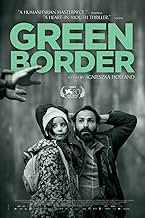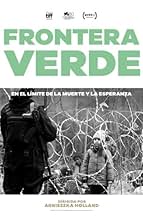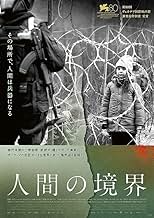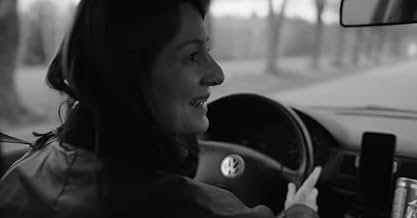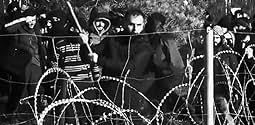VALUTAZIONE IMDb
6,4/10
7386
LA TUA VALUTAZIONE
Segui una famiglia di rifugiati siriani, un insegnante di inglese dall'Afghanistan e una guardia di frontiera, quando si incontrano tutti al confine polacco-bielorusso durante l'ultima crisi... Leggi tuttoSegui una famiglia di rifugiati siriani, un insegnante di inglese dall'Afghanistan e una guardia di frontiera, quando si incontrano tutti al confine polacco-bielorusso durante l'ultima crisi umanitaria in Bielorussia.Segui una famiglia di rifugiati siriani, un insegnante di inglese dall'Afghanistan e una guardia di frontiera, quando si incontrano tutti al confine polacco-bielorusso durante l'ultima crisi umanitaria in Bielorussia.
- Regia
- Sceneggiatura
- Star
- Premi
- 30 vittorie e 32 candidature totali
Behi Djanati Atai
- Leïla
- (as Behi Djanati Ataï)
Muhammad Al Rashi
- Grandpa
- (as Al Rashi Mohamad)
Michal Zielinski
- Sasza
- (as Michael Zielinski)
6,47.3K
Attività insolita
Our rating mechanism has detected unusual voting activity on this title. To preserve the reliability of our rating system, an alternate weighting calculation has been applied.
Recensioni in evidenza
"Green border" shows immigration from a different perspective than is slowly becoming mainstream in Europe, being it Poland (the land in which the film is situated), Holland (in which the anti-immagration party PVV won the election of november 2023) or England (that want to send refugees to Rwanda).
The situation on the Eastern border of Poland is different in this respect that the Belarus of Lukashenko uses refugees as a weapon against the European Union (EU). They lure refugees to Belarus with the promise that the transit to the EU (i.e. Poland) is without any difficulty, which of course is not the case.
"Green border" is a documentary like film that shows the story from different perspectives. These perspectives are those of a Syrian family, Polish border guards and Polish activists.
The episodes about the Syrian family and the border guards are heavy stuf and the episode about the Polish activists is desperately needed to bring back some confidence in humanity.
The conservative Polish government was very angry about the movie and even called director Agnieszka Holland a Nazi. This is of course ridiculous. The anger was most probably directed against the episode about the Polish border guards, but even these episode is not totally negative as its shows that the border guard these episode is about has increasing psychological difficulties with the job he is doing (pushing back refugees to Belarus). The episode is indeed very critical about his superior, telling the border guards that the refugees are not human beings but bullets fired by Lukashenko.
One perspective that is missing is the Belarussian one. One can criticize the harsh behaviour of the Polish border guards but there can be no doubt abourt the fact that Belarus started using the refugees as pawns in a cynical political power struggle.
Also from Western Europe we have to be carefull with too much criticism. The push backs on land by the Polish border guards are illegal, but what about the push backs on sea by Frontex? Moreover, we have easy talk, not bordering on a cynical regime like that of Lukashenko.
Images say more than 1000 words and in this respect the film is in my opinion a must see for those who want to understand more about the immagration crisis. In the Netherlands I had the feeling that the film was in roulation very short. I had to hurry to visit the last performance and was accompanied by only one fellow visitor.
To conclude one point of critic. In the epilogue the film shows how welcome Ukrainian refugees were when in february 2022 their country was invaded by Russia, strongly suggesting that there is a racist element in which refugeest are being supported and which not. I would like to qualify this suggestion. In the first place the aggressor in the Ukranian war is also a threat to Poland, unlike the aggressors in the other conflicts generating refugees (such as Assad in Syria). In the second place has the loyalty with Ukraine cooled down considerably (not in words but in deeds) after two years of war.
The situation on the Eastern border of Poland is different in this respect that the Belarus of Lukashenko uses refugees as a weapon against the European Union (EU). They lure refugees to Belarus with the promise that the transit to the EU (i.e. Poland) is without any difficulty, which of course is not the case.
"Green border" is a documentary like film that shows the story from different perspectives. These perspectives are those of a Syrian family, Polish border guards and Polish activists.
The episodes about the Syrian family and the border guards are heavy stuf and the episode about the Polish activists is desperately needed to bring back some confidence in humanity.
The conservative Polish government was very angry about the movie and even called director Agnieszka Holland a Nazi. This is of course ridiculous. The anger was most probably directed against the episode about the Polish border guards, but even these episode is not totally negative as its shows that the border guard these episode is about has increasing psychological difficulties with the job he is doing (pushing back refugees to Belarus). The episode is indeed very critical about his superior, telling the border guards that the refugees are not human beings but bullets fired by Lukashenko.
One perspective that is missing is the Belarussian one. One can criticize the harsh behaviour of the Polish border guards but there can be no doubt abourt the fact that Belarus started using the refugees as pawns in a cynical political power struggle.
Also from Western Europe we have to be carefull with too much criticism. The push backs on land by the Polish border guards are illegal, but what about the push backs on sea by Frontex? Moreover, we have easy talk, not bordering on a cynical regime like that of Lukashenko.
Images say more than 1000 words and in this respect the film is in my opinion a must see for those who want to understand more about the immagration crisis. In the Netherlands I had the feeling that the film was in roulation very short. I had to hurry to visit the last performance and was accompanied by only one fellow visitor.
To conclude one point of critic. In the epilogue the film shows how welcome Ukrainian refugees were when in february 2022 their country was invaded by Russia, strongly suggesting that there is a racist element in which refugeest are being supported and which not. I would like to qualify this suggestion. In the first place the aggressor in the Ukranian war is also a threat to Poland, unlike the aggressors in the other conflicts generating refugees (such as Assad in Syria). In the second place has the loyalty with Ukraine cooled down considerably (not in words but in deeds) after two years of war.
Polish director Agnieszka Holland's impassioned examination of the European refugee crisis from her nation's perspective. Holland's film, which she also co-wrote, is a sprawling work which begins by following a family of Syrians who are trying to the EU through Russian dominated Belarus. From there, the movie weaves it way to the Border Guards and, eventually, ia small band of mostly female Aid workers who give medical and legal assistance to the immigrants.
The structure is a bit daunting even though there are loose connections binding it all together. Cinematographer Tomasz Naumiuk shoots in an austere Black and White with Frédéric Vercheval's brooding score as accompaniment. The large cast is quite good with Maja Ostarszewska a standout as the, perhaps a bit naive Julia, one of the Polish volunteers. Behi Djanati Atai is memorable as a defiant Afghan woman who crosses the border with the Syrians. What knits it together is Holland's vision, which becomes clearer and clearer as the various strands are brought together - while simulataneously being torn assunder.
Holland never flinches from the painful and graphic details of the refugees' plight. They are literal political footballs booted from one side of the border to the other. There are times when the structure doesn't completely work and the filmmaker does dwell a bit on some seemingly extraneous details, but, there is no questioning Holland's fervor - much of it directed at Poland's leadership. It's been a highly controversial film within the nation and its government, and throughout much of Europe.
Unsurprisingly, it was NOT Poland's official submission to this past year's Academy Awards.
At 75, Holland (an Oscar nominee for EUROPA EUROPA) has made a daring - some would say angry - film. A stunning work of art that demands to be seen.
The structure is a bit daunting even though there are loose connections binding it all together. Cinematographer Tomasz Naumiuk shoots in an austere Black and White with Frédéric Vercheval's brooding score as accompaniment. The large cast is quite good with Maja Ostarszewska a standout as the, perhaps a bit naive Julia, one of the Polish volunteers. Behi Djanati Atai is memorable as a defiant Afghan woman who crosses the border with the Syrians. What knits it together is Holland's vision, which becomes clearer and clearer as the various strands are brought together - while simulataneously being torn assunder.
Holland never flinches from the painful and graphic details of the refugees' plight. They are literal political footballs booted from one side of the border to the other. There are times when the structure doesn't completely work and the filmmaker does dwell a bit on some seemingly extraneous details, but, there is no questioning Holland's fervor - much of it directed at Poland's leadership. It's been a highly controversial film within the nation and its government, and throughout much of Europe.
Unsurprisingly, it was NOT Poland's official submission to this past year's Academy Awards.
At 75, Holland (an Oscar nominee for EUROPA EUROPA) has made a daring - some would say angry - film. A stunning work of art that demands to be seen.
Agnieszka Holland's *Green Border* (*Zielona granica*) is a powerful and unflinching portrayal of the humanitarian crisis at the Polish-Belarusian border. Through the intersecting stories of a Syrian refugee family, an Afghan English teacher, and a conflicted border guard, the film sheds light on the harrowing realities faced by those caught in the no-man's-land of geopolitical conflict.
Jalal Altawil delivers a heart-wrenching performance as the father of the Syrian family, embodying both resilience and despair. Maja Ostaszewska portrays the Afghan teacher with a quiet strength that anchors her story, while Behi Djanati Atai adds nuance to the role of a border guard torn between duty and conscience. Together, their narratives create a tapestry of human suffering, hope, and moral ambiguity.
Holland's direction is both compassionate and unrelenting, refusing to shy away from the brutality of the situation. The stark, desolate visuals of the borderlands, captured with haunting beauty, underscore the desperation of those trapped in this liminal space. The screenplay, co-written by Holland, Maciej Pisuk, and Gabriela Lazarkiewicz, navigates complex themes of humanity, politics, and survival without resorting to simplifications or clichés.
At 2 hours and 32 minutes, the film's runtime allows for a thorough exploration of its characters and their plights, though some viewers may find the pacing demanding. Nevertheless, the emotional impact and urgent relevance of *Green Border* make it a vital watch.
This is a film for those who seek stories that challenge and provoke, offering no easy answers but demanding empathy and reflection. *Green Border* is a haunting reminder of the human cost of political indifference.
Rating: 8/10 - A deeply moving and essential portrayal of a modern humanitarian crisis.
Jalal Altawil delivers a heart-wrenching performance as the father of the Syrian family, embodying both resilience and despair. Maja Ostaszewska portrays the Afghan teacher with a quiet strength that anchors her story, while Behi Djanati Atai adds nuance to the role of a border guard torn between duty and conscience. Together, their narratives create a tapestry of human suffering, hope, and moral ambiguity.
Holland's direction is both compassionate and unrelenting, refusing to shy away from the brutality of the situation. The stark, desolate visuals of the borderlands, captured with haunting beauty, underscore the desperation of those trapped in this liminal space. The screenplay, co-written by Holland, Maciej Pisuk, and Gabriela Lazarkiewicz, navigates complex themes of humanity, politics, and survival without resorting to simplifications or clichés.
At 2 hours and 32 minutes, the film's runtime allows for a thorough exploration of its characters and their plights, though some viewers may find the pacing demanding. Nevertheless, the emotional impact and urgent relevance of *Green Border* make it a vital watch.
This is a film for those who seek stories that challenge and provoke, offering no easy answers but demanding empathy and reflection. *Green Border* is a haunting reminder of the human cost of political indifference.
Rating: 8/10 - A deeply moving and essential portrayal of a modern humanitarian crisis.
Very complicated topic treated in a masterful way. Committed film, so much so, that many purely political comments and ratings have appeared probably from ¨reviewers¨ who I doubt have even seen the film (calling it boring is simply absurd, giving 1 point in 10 is absurd).
It is difficult not to respond emotionally to the harshness of what is presented to us. Self-security, fear, comfort in the face of the insecurity and suffering of others. Some heroes without hesitation align themselves with those who suffer, others not so much out of comfort or risk and others are simply bad people who take advantage of every situation to bring out the worst in themselves. Whether they are Poles, Belarusians or Muslims is simply circumstantial. Poor people used as cannon food, this is happening in our true world and we are lucky to have people who reflect this with their artwork.
The actors are very good, the script, photography and direction are very good. It is, above all, a very complete film that keeps the viewer in tension and takes them out of their comfort zone.
It is difficult not to respond emotionally to the harshness of what is presented to us. Self-security, fear, comfort in the face of the insecurity and suffering of others. Some heroes without hesitation align themselves with those who suffer, others not so much out of comfort or risk and others are simply bad people who take advantage of every situation to bring out the worst in themselves. Whether they are Poles, Belarusians or Muslims is simply circumstantial. Poor people used as cannon food, this is happening in our true world and we are lucky to have people who reflect this with their artwork.
The actors are very good, the script, photography and direction are very good. It is, above all, a very complete film that keeps the viewer in tension and takes them out of their comfort zone.
Movies like "Green Border" are tricky. If you're watching it in the first place, you likely already have some awareness of and empathy for the plight of refugees and migrants who are being demonized around the world. If you need to be convinced that they are deserving of empathy, you're probably not ever going to watch this movie. So the onslaught of suffering we are subjected to feels like punishment, like we're being lectured on something we already believe.
I thought I might bail on this movie at about the 30-minute mark. That first half hour is misery porn about a Syrian family trying to make its way across the Belarus/Poland border and the inhumanity they face. I felt for them, but didn't want to watch a movie that was just going to throw in my face misery that I already feel bad about. But veteran director Agnieska Holland had something more varied in mind for this film, and the perspective switches multiple times to show events from the perspective of a Polish border guard, a group of activists trying to help the refugees, and a psychotherapist who turns her outrage into action and joins the cause.
"Green Border" is a well made movie, and it's pretty engrossing. But there's something a little too narratively slick about it. I've seen documentaries about the refugee crisis, and though it tries, this movie doesn't capture the visceral, life or death desperation of those films. Maybe it's not fair to ask it to, but it's hard to feel completely satisfied by this movie's fictional version of what's happening in the world when the real thing is being documented and made available. If this had been my first exposure to the refugee crisis, I might have found it to be more searing than I did. And there's something a little naive about it too. It's very simple in its ideology. All of the refugees and anyone on their side is good, anyone working against the refugees is bad, and there's no nuance or attempt to address the complicated social impact of large masses of people entering countries without the resources to support them. In this movie's version, if we all just open our borders and welcome whoever wants to come in, we'll all live together in a utopian society and won't that be wonderful. But that's not the way the world works. I'm one of the first to wish it did, but I'm more realistic than that. I wish this movie had been more realistic about it too.
But all that aside, it is still a very effective movie, and I found myself more enraged than depressed by it. I'm afraid I might be one of the ineffectual liberals criticized in the movie, people who feel bad about what's happening but don't actually do anything about it. To be fair to myself, I'm not sure exactly what it is I'm supposed to be doing, but still, movies like this make me want to just go out in the world and help someone, anyone, so I guess this film serves a valuable purpose in that regard.
Grade: A.
I thought I might bail on this movie at about the 30-minute mark. That first half hour is misery porn about a Syrian family trying to make its way across the Belarus/Poland border and the inhumanity they face. I felt for them, but didn't want to watch a movie that was just going to throw in my face misery that I already feel bad about. But veteran director Agnieska Holland had something more varied in mind for this film, and the perspective switches multiple times to show events from the perspective of a Polish border guard, a group of activists trying to help the refugees, and a psychotherapist who turns her outrage into action and joins the cause.
"Green Border" is a well made movie, and it's pretty engrossing. But there's something a little too narratively slick about it. I've seen documentaries about the refugee crisis, and though it tries, this movie doesn't capture the visceral, life or death desperation of those films. Maybe it's not fair to ask it to, but it's hard to feel completely satisfied by this movie's fictional version of what's happening in the world when the real thing is being documented and made available. If this had been my first exposure to the refugee crisis, I might have found it to be more searing than I did. And there's something a little naive about it too. It's very simple in its ideology. All of the refugees and anyone on their side is good, anyone working against the refugees is bad, and there's no nuance or attempt to address the complicated social impact of large masses of people entering countries without the resources to support them. In this movie's version, if we all just open our borders and welcome whoever wants to come in, we'll all live together in a utopian society and won't that be wonderful. But that's not the way the world works. I'm one of the first to wish it did, but I'm more realistic than that. I wish this movie had been more realistic about it too.
But all that aside, it is still a very effective movie, and I found myself more enraged than depressed by it. I'm afraid I might be one of the ineffectual liberals criticized in the movie, people who feel bad about what's happening but don't actually do anything about it. To be fair to myself, I'm not sure exactly what it is I'm supposed to be doing, but still, movies like this make me want to just go out in the world and help someone, anyone, so I guess this film serves a valuable purpose in that regard.
Grade: A.
Lo sapevi?
- QuizAt 00:11:12, a refugee checks their location using an OpenStreetMap-based map on a smartphone. The location shown is the Poland-Belarus border at 52.61281 23.74398.
I più visti
Accedi per valutare e creare un elenco di titoli salvati per ottenere consigli personalizzati
- How long is Green Border?Powered by Alexa
Dettagli
Botteghino
- Lordo Stati Uniti e Canada
- 96.595 USD
- Fine settimana di apertura Stati Uniti e Canada
- 7305 USD
- 23 giu 2024
- Lordo in tutto il mondo
- 4.240.827 USD
- Tempo di esecuzione2 ore 32 minuti
- Colore
Contribuisci a questa pagina
Suggerisci una modifica o aggiungi i contenuti mancanti





